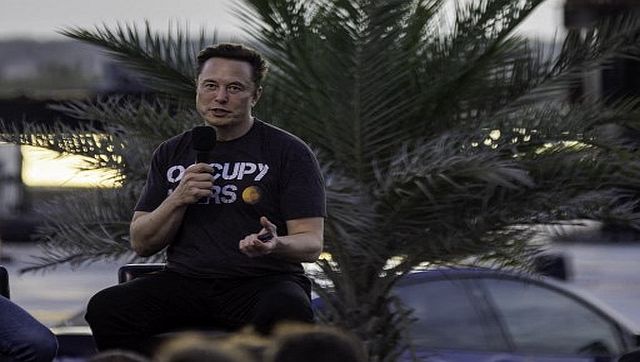Elon Musk is known for his inventions. He’s the founder of
rocket firm SpaceX
, the CEO of electric car maker Tesla. But with his
purchase of Twitter
, his proclivity for inventing and using new words and phrases has come under fierce scrutiny. There’s “hyperloop” (a proposed high-speed, tube-based transportation system), “supercharger” (a rapid electric car charger) and “gigafactory” (a large manufacturing facility for electric car batteries). These invented words speak to Musk’s supersized ambitions. But they have also had a palpable impact on language. Eight years after it was popularised by Musk, gigafactory is
now a common term
in manufacturing even among Tesla’s rivals. Other words such as “cybertruck” (Tesla’s prototype electric truck) conjure up the futuristic images that Musk aspires to with his inventions. Successfully coining words and phrases like this is a sign of the billionaire’s long-term influence. The language of ambition When
Musk outlined
his vision for SpaceX, he suggested that he was not interested in profit but in solving technical problems, sparking renewed excitement about space exploration and eventually developing a colony on Mars. In
an early interview
, he said: “The dream of space is an integral part of the American identity. So, if people think that there is a way to get to space, they will take that path. We need to show that it exists.” Spurred on by Musk’s rhetoric, SpaceX has undoubtedly pushed boundaries and advanced human ambitions in space. Musk uses his celebrity status to make enthymematic arguments — arguments in which some premises are omitted as obvious. This works effectively with his many followers, and in fields like
the artificial intelligence debate
. Musk positions himself as an expert who wants to solve problems, bypassing the traditional high costs of the car and aerospace industries to come up with effective solutions. To do this, he speaks in sets of propositions that seek to represent common knowledge without providing further information. This works well for him because his celebrity offers a prestige which appears to compensate for a lack of deep expertise in many of the areas he discusses. This is in contrast to traditional experts such as
Nicholas Bostrom
(the
University of Oxford
philosopher with a background in theoretical physics, computational neuroscience and artificial intelligence who has influenced many of
Musk’s ideas
), who the public typically expects to demonstrate their technical knowledge. But if the motivation for Musk’s space ventures was supposedly to satisfy public interest, what is his ambition for the recent purchase of Twitter?
Musk stated
that Twitter is “the platform for free speech around the world”, but that it cannot achieve this “societal imperative” in its current form and “needs to be transformed as a private company”. A privately-owned Twitter
may more readily fulfil
its business potential to investors, yet there are doubts as to whether it can satisfy the social potential of users. Here, his words matter again.
Musk has pledged
that his ambition is for the platform to become “the most accurate source of information”. Yet the
decision by Twitter
, as of 30 November, to no longer enforce its policy on
COVID misinformation
(a five-strike system that took action against accounts posting “demonstrably false or misleading” content) suggests Musk’s words aren’t being supported by his actions. The language of utopia One of Musk’s grander ambitions is to change the nature of language itself. Through his
Neuralink company
, Musk aims to enable telepathy via neural implants connecting humans and computers, rendering
human language obsolete
. No doubt humans can coexist with AI, but a goal of bypassing human language entirely to enable “direct brain-to-machine communication” seems absurd. A so-called
“wordless cyborg future”
is concerning because
language
not only
helps us to communicate
, but also enables us to
infer
meaning
and explain and elaborate
complex socio-cultural concepts
. It also inspires us to make emotional connections. Words, alongside ethical behaviour and value judgements, constitute our moral being. Wealthy entrepreneurs like Musk try to convince us with their words that everything is possible. However, socio-cultural institutions like Twitter need to remain open and free, not subjected to vested business or political interests. In the
era of neo-liberalism
, it is imperative to guarantee freedom of expression, independent global public spheres and open civil society, so that we might critically engage with the way political and economic powers
seek to manipulate
platforms like Twitter. Whether they realise it or not, billionaires’ language has consequences. Musk should be responsible with the way that he uses his. This article is republished from
The Conversation
under a Creative Commons license. Read the
original article
. Read all the Latest News
, Trending News
, Cricket News
, Bollywood News
, India News
and Entertainment News
here. Follow us on
Facebook
,
Twitter
and
Instagram
.
This article is republished from
The Conversation
under a Creative Commons license. Read the
original article
. Read all the Latest News
, Trending News
, Cricket News
, Bollywood News
, India News
and Entertainment News
here. Follow us on
Facebook
,
Twitter
and
Instagram
.
Gigafactory, cybertruck, hyperloop: What Elon Musk's words teach us about his ambitions
the conversation
• December 2, 2022, 10:09:25 IST
Elon Musk’s words have a noticeable impact on language. Eight years after it was popularised by the new Twitter owner, gigafactory is now a common term in manufacturing
Advertisement
)
End of Article